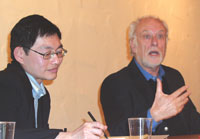
The Limits of Thinking in Decolonial Strategies

The text of Walter Mignolo’s Avenali lecture “Delinking: The Rhetoric of Modernity, the Logic of Coloniality, and the Grammar of Decoloniality” can be read as a manifesto that announces an extremely imaginative and ambitious project.
Mignolo announces nothing less than a radical critique of modernity that seeks to situate it within what he calls “coloniality.” By the term “coloniality,” he seems to designate something that is much wider than the related historical projects of imperialism and colonialism. It refers to an epochal condition and an epistemological frame that binds these historical projects to modernity in an inseverable manner. Mignolo suggests that a totalitarian idea of totality is a key feature of modernity. Modernity conserves itself as a totality by positing an “outside” of Europe and the North Atlantic that is excluded from modernity through a discourse of racism. The rhetoric of modernity therefore leads inevitably to a logic of coloniality. This frame also engulfs the present and underwrites much radical thought that occurs under the rubric of “emancipation,” including Marx’s idea of a proletarian revolution as well as Toni Negri and Michael Hardt’s idea of the multitude, but also varieties of post-structuralism, postmodernism, and postcolonial theory.
What Mignolo counterposes to this entire formation is a project of liberation that involves delinking from coloniality and modernity. He calls this project “decoloniality” and it involves generalizing the experiences of decolonization and anticolonial struggles in Asia, Africa, and Latin America as well as the experiences of the damnés, the wretched of the earth, into a new epistemic frame. The project of decoloniality therefore involves a double gesture: first, the re-embodiment and relocation of thought in order to unmask the limited situation of modern knowledges and their link to coloniality, and second, an-other thinking that calls for plurality and intercultural dialogue, especially within the South. Mignolo’s manifesto is syncretically rich and wide-ranging in its scope and polemical reach. It traverses the discourses of philosophy and various social sciences and the humanities and also draws on radical activist discourse. But more importantly, it is so uplifting in its spirit of demagogic optimism that it is difficult to disagree with most of its exhortations.
I would like to begin by focusing on a rhetorical gesture that runs throughout Professor Mignolo’s text. The single word title of the text, “Delinking,” is identical to a book written by the Marxist political economist, Samir Amin (Delinking: Towards a Polycentric World). Yet, Mignolo repeatedly distances his project from that of Amin (and all dependency theory) for at least two reasons. First, Amin only conceived of political and economic delinking, i.e. delinking in the sphere of political economy. He did not understand the urgent need for delinking at the epistemic level, the more fundamental level of thought. Hence, Amin’s project fails to break with the modern concept of totality. Second, and as a consequence of this failure to engage in epistemic delinking, Amin remains caught up in the modern disembodied universalistic project of Marxism. It is thus not really a radical delinking but only “radical emancipation within the rhetoric of modernity and the logic of coloniality.”
A different polemical critique is directed at the postcolonial theory of Edward Said, Gayatri Spivak, and Homi Bhabha. Postcolonial theory may engage in the epistemic questioning of the concept of totality and may also be critical of modernity. However, since it is grounded on the poststructuralism of Foucault, Lacan, and Derrida, it is still “a project of scholarly transformation within the academy” that remains internal to Europe. Unlike decoloniality, the postcolonial is not attuned to what Mignolo calls “other sources:” the critique and activism (“radical political and epistemological shifts”) of various important figures from Asia, Africa, and Latin America such as Gandhi, Cabral, and Fanon.
What unites these two polemical gestures is a sense of the primacy of the epistemic in undoing coloniality. However, Mignolo also has a rather unusual understanding of the epistemic that gives it a special affinity to the damnés. On the one hand, a Marxist political-economic approach to delinking is not conceptual enough since it does not broach the fundamental level of thought. It fails to take over “epistemic power.” On the other hand, however, the intensely epistemic reflections of postcolonial theory remain too abstract and rarefied. “The epistemic locations for delinking,” Mignolo believes, “come from the emergence of the geo- and body-politics of knowledge.” In other words, the epistemic has to have a material dimension. But its materiality is not that of the structures of political economy but of the corporeal experiences of those who have been excluded from the production of knowledge by modernity.
What I would like to focus on are not the details of Mignolo’s polemical criticisms, but instead the account of power implied by his understanding of the epistemic. What is put forward here is a logocentrism of power. For Mignolo, power, whether it is oppressive or liberatory, has a logic that we can chart, decipher, and ultimately correct. There is a logic of coloniality and it has to be counteracted by a logic of decoloniality. Delinking from the colonial matrix of power does not seek to reject modernity and its conceptual system because this is so widespread. It requires instead, Mignolo believes, “border thinking or border epistemology in the precise sense that the Western foundation of modernity and of knowledge is, on the one hand, unavoidable and, on the other, highly limited and dangerous.” Coloniality is ultimately always a failure of thought, of knowledge, or of a logic that is dangerous. This is also, in many respects, a top-down theory of power, where power is repressive and emanates from a totalizing source according to a logical design or plan. Events and occurrences up to and including the present are grounded in a logic that is dangerous or mistaken and that needs to be corrected by the intervention of other logics that emanate from the various subjects that have been excluded and subjugated by coloniality.
It is at this point that the question of the re-embodiment and relocation of knowledge becomes crucial. For Mignolo admits that the project of epistemic delinking may sound “somewhat messianic.” I would say perhaps “idealistic” in the colloquial sense. However, he immediately asserts that it is “an orientation that in the first decade of the 21st century has shown its potential and its viability,” for example, in the various World Social Forums. Many historical examples of liberation are also adduced: the Amaru rising in Peru, the Hatian revolution and decolonization in Asia and Africa. As opposed to the false other that modernity has invented as its exteriority or outside, the outside that it has excluded in order to create itself, these truly other voices introduce “other cosmologies into the dominance and hegemony of Western cosmological variations within the same rhetoric of modernity and logic of coloniality.”
The logic of decoloniality was then explicitly thematized in the thought of radical Arabo-Islamic thinkers in the 1960s and 1970s such as Ayatollah Khomeini and by philosophy of liberation in Latin America and by first-nation intellectuals. The stress is placed on the importance of “other” languages that have been negated by colonial modernity. The argument here is similar to the epistemology of location in feminist theory and critical race theory (for example, Luce Irigaray).
I would like to end by posing two questions concerning the two main limbs of Mignolo’s argument: the primacy of the epistemic and the urgency of embodying and locating knowledge. First, does power in fact operate according to a logic and from a totalizing source that represses and subjugates those it has excluded in contemporary globalization? Is the link between modernity and coloniality primarily epistemic in character? It is interesting to note from this perspective that when Mignolo attempts to establish the epistemic link between modernity and coloniality, he relies on a historical biography and the fiction of a collective will or intention to dominate and colonize: “The rhetoric of modernity has been predominantly put forward by European men of letters, philosophers, intellectuals, officers of the state. The modern/colonial power differential was, of course, structured at all levels (economic, political, epistemological, militarily), but it was at the epistemological level that the rhetoric of modernity gained currency. If we had time to go into the biography of the main voices that conceived ‘modernity’ as the series of historical events….all of them would originate in one of the six European countries leading the Renaissance, the colonial expansion and capitalist formation, and the European Enlightenment.” In this view, development in the postcolonial world would be an ideological ruse of the logic of coloniality that forecloses the voices of marginalized peoples.
Yet, one might argue that exploitative development in contemporary globalization operates not by racist techniques of exclusion and marginalization, but precisely by including, integrating, and assimilating every being into the circuit of the international division of labor. This is done by transforming them into reserve labor power through techniques of what Foucault called biopower. But we would here need to understand biopower in a different way from Mignolo’s understanding of biopolitics or body-politics, a difference that he also acknowledges. This different understanding of power as productive as opposed to repressive seems especially important in contemporary globalization where the flows of transnational capital fabricate the economic well-being of nation-states and their individual citizens. First, at the macrological level of global political economy, states undertake aggressive policy initiatives to open up their markets and attract foreign capital. Second, at the level of the biopolitical production of the individual and the population, techniques of discipline and government craft the bodies of individuals as bodies capable of work and create their needs and interests as members of a population. Third, at the level of social reproduction, global mass consumer culture also leads to the proliferation of sophisticated consumer needs and desires. These processes constitute the conditions of possibility of the political and economic self-determination and sovereignty of collective subjects and the self-mastery and security of individual subjects. In other words, the current state of power relations is an effect of multiple processes that are dynamic, heterogeneous, and unstable, processes that cannot be reduced to a single logic of coloniality, although the latter can emerge as their effect. What is the relation between these two different conceptions of biopolitics? Do they contradict each other? How would the wretched of the earth fit into this alternative cartography of global power that I have sketched?
This leads me to my second question. The focus on re-embodying knowledges and knowledges in other languages can very easily lead to an idealization of bodily experiences and the concrete and the linguistic other. First, do concrete corporeal experiences offer a genuinely other perspective if the concrete bodily needs of individuals are crafted by the techniques of biopower as they are incorporated into the international division of labor? Second, indigenous languages are not inherently egalitarian or liberating just because they are non-European. Non-European languages can have hierarchical, conservative, or reactionary forms of address. Third, how are we to account for the startling similarity between Mignolo’s account of pluriversality and intercultural communication and the kind of cultural pluralism espoused by UNESCO? Here, one should also note the importance of language learning and multiculturalism to the operations of multinational capital. These are all forms of bio-power in the Foucauldian sense. How does one distinguish this from Mignolo’s sense of bio- or body-politics? The problem might well be that we cannot do so.
One would need to look at the true heterogeneity of the outside and the complex and multifarious technologies that fabricate these various outsides, not just at the level of a racist rhetoric of exclusion, but at the most concrete level of the production of the bodily needs and interests of subjects claiming alterity.
Pheng Cheah is Associate Professor of Rhetoric.
This article can be found in the November/December 2006 newsletter.
